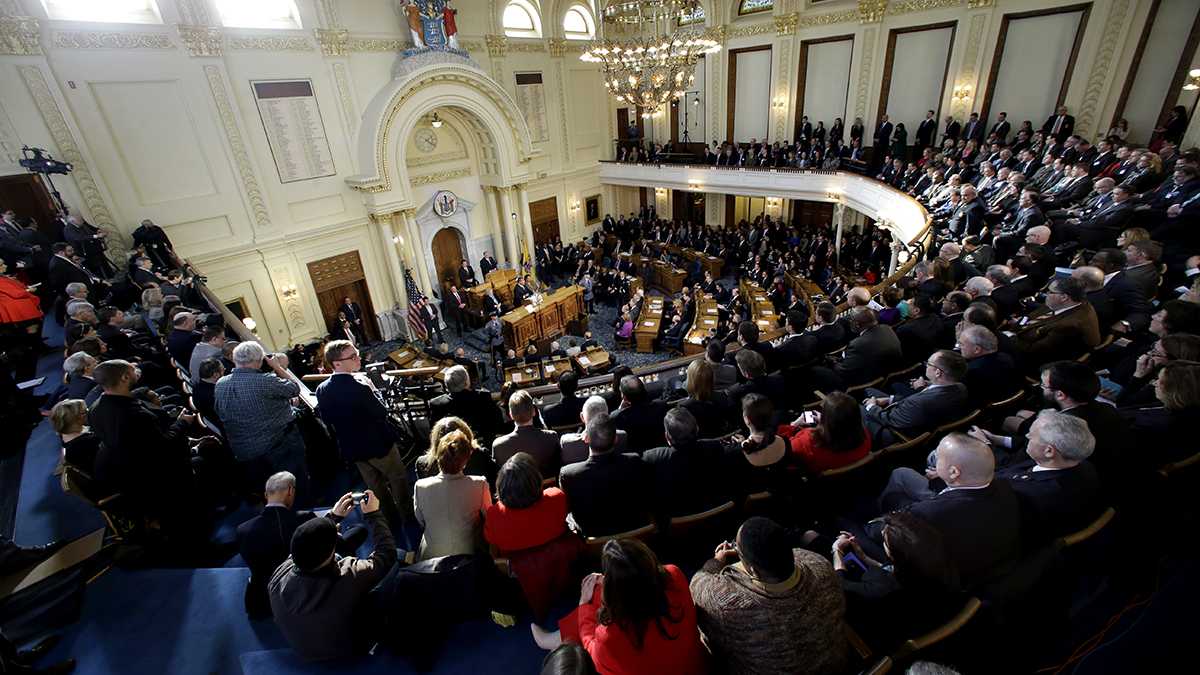What to watch for in Chris Christie’s final N.J. budget address

Governor Christie will give his budget address to a joint-session of the Legislature. (AP Photo/Mel Evans)
New Jersey Gov. Chris Christie will present the final state budget of his two-term tenure tomorrow afternoon in a speech before a joint session of the Legislature in Trenton. While Christie and lawmakers have already been jockeying over the issue of school aid in advance of the budget address this year, there are also open questions about the impact that looming changes from a new administration in Washington, D.C., could have on the state’s finances. This year is also a full election year in New Jersey, with the governor’s office and all 120 legislative seats on the November ballot.
WHO: Governor Chris Christie
WHAT: Fiscal Year 2018 Budget Address
WHEN: Tuesday, February 28, 2017 at 2:00 p.m.
WHERE: State House, Assembly Chambers125 West State StreetTrenton, N.J.
Since gubernatorial budget addresses are typically longwinded and littered with lots of numbers, here’s a list of the biggest issues to look out for as the fiscal year 2018 budget is officially unveiled this week.
1. School funding
The biggest issue heading into this year’s budget address revolves around the issue of school funding. The state’s current school-aid law was enacted in 2008, and there have been growing concerns about inequities that have developed over the years. Christie hasn’t been fully funding the formula at the heart of the law, and his administration has kept in place temporary measures that have resulted in some school districts receiving far more than they should under the formula and others receiving far less.
Christie has also proposed a sweeping revision of the funding formula, one that Democratic legislative leaders strongly oppose and have stalled. Whether Christie will attempt to enact some version of his formula through the budget is still very much an open question.
2. Public-employee pension funding
Under a plan endorsed by Christie in 2010, New Jersey was supposed to reach full state funding of the public-employee pension system by the upcoming 2018 fiscal year. But Christie, during a recent radio appearance, said the new budget that he’ll be proposing will include $2.5 billion or about half the amount that actuaries say is needed to repair a pension system that was recently named the nation’s worst funded. Christie has also suggested he may ask lawmakers to consider enacting new benefits changes for public workers, though Democratic legislative leaders are unlikely to work with him this year.
3. Property tax relief
Last year brought another increase in the typical New Jersey property tax bill, hiking the statewide average to a record high of $8,549. But even as bills have continued to go up, funding for popular property-tax relief programs that come out of the state budget has remained flat or even been decreased slightly. That has meant the tax relief for seniors and low- and middle-income homeowners has not kept pace with the increases, compounding the impact of the rising property-tax bills. But this year, with all 120 legislative seats up for grabs in November, lawmakers would certainly welcome an increase in funding for property-tax relief before they hit the campaign trail.
4. The Trump effect
For the last several weeks, President Donald Trump and Republicans who control the Congress have been talking about the need to repeal the federal Affordable Care Act. Given the popularity of President Barack Obama’s signature healthcare initiative in New Jersey, such a move could saddle the state with as much as $4 billion in additional costs by some estimates. Trump, meanwhile, is also in the midst of a crackdown on undocumented immigrants and has threatened to take away federal funding from so-called sanctuary cities. But studies also show undocumented immigrants pay hundreds of millions of dollars in state and local taxes in New Jersey each year, meaning a mass exodus could hit the state budget hard.
5. New Jersey Transit
Lawmakers have been holding a series of hearings on NJ Transit, going over its financial stability and safety record in the wake of last year’s fatal train crash in Hoboken. Transportation advocates have also repeatedly pointed out that NJ Transit right now relies far more heavily than its peers on revenue from rider fares, which have been increased twice during Christie’s tenure. The agency has also had a history of cannibalizing some of its capital funds to cover operating expenses, leading to increasing calls for more substantial state budget support. The advocates have also tied the issue to the broader state economy, arguing that if commuting conditions deteriorate much further, people holding high-paying jobs in New York could decide to move out of New Jersey, taking their tax revenue elsewhere while also hurting the state’s still-recovering housing market.
________________________________________________________
NJ Spotlight, an independent online news service on issues critical to New Jersey, makes its in-depth reporting available to NewsWorks.
WHYY is your source for fact-based, in-depth journalism and information. As a nonprofit organization, we rely on financial support from readers like you. Please give today.




